
Java JSON processing has always been one of the problems that programmers often encounter during the development process. When working with data, using JSON effectively is crucial. This article is brought to you by PHP editor Xigua, the ultimate guide to Java JSON processing. It will reveal various techniques and methods for processing data, help you make better use of JSON for data processing, and improve development efficiency.
Introduction
jsON (javascript Object Notation) is a lightweight data exchange format widely used in networkApplication and api. The Java programming language provides a series of libraries and tools for processing JSON data, allowing developers to easily interact with JSON-based systems.
Parse JSON data
To parse a JSON string and convert it to a Java object, you can use the following method:
import com.Google.gson.Gson;
String json = "{"name":"John Doe","age":30}";
Gson gson = new Gson();
Person person = gson.fromJson(json, Person.class);
Gson is a popular JSON parsing library that provides a fromJson method to convert a JSON string to a specified Java type.
Create JSON data
To create a JSON string, you can use the following methods:
import com.google.gson.Gson;
Person person = new Person("John Doe", 30);
Gson gson = new Gson();
String json = gson.toJson(person);
The toJson method converts a Java object to a JSON string.
Manipulate JSON data
Once the JSON data is parsed, it can be manipulated using:
import org.json.JSONObject;
JSONObject json = new JSONObject("{"name":"John Doe","age":30}");
json.put("age", 31);
System.out.println(json.toString());
The JSONObject class provides methods for manipulating JSON objects, including the put and toString methods.
Advanced JSON Processing
Java also provides some more advanced JSON processing functions, including:
- Stream parsing: Use a stream parser to parse large amounts of JSON data at once.
- JSON Path: Query and manipulate nested JSON data using JSONPath expressions.
- Custom parsers and serializers: Create custom parsers and serializers to handle complex or custom JSON data types.
Best Practices
When processing JSON data, follow these best practices to improve efficiency and reliability:
- Use an appropriate library (e.g. Gson) to simplify parsing and creation.
- Validate the input JSON string to ensure its validity.
- Use caching mechanism to improve performance.
- Consider using a stream parser to handle large amounts of data.
in conclusion
Mastering JSON processing in Java is critical for interacting with JSON-based systems. This article provides step-by-step guidance for parsing, creating, and manipulating JSON data and introduces advanced JSON processing capabilities. By following best practices, developers can efficiently handle JSON data and build robust WEB applications and APIs.
The above is the detailed content of Java JSON Processing Demystified: The Ultimate Guide to Processing Data. For more information, please follow other related articles on the PHP Chinese website!
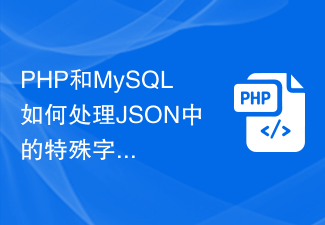 PHP和MySQL如何处理JSON中的特殊字符和转义符号?Jul 13, 2023 pm 10:29 PM
PHP和MySQL如何处理JSON中的特殊字符和转义符号?Jul 13, 2023 pm 10:29 PMPHP和MySQL如何处理JSON中的特殊字符和转义符号?随着互联网的快速发展,JSON(JavaScriptObjectNotation)作为一种轻量级的数据交换格式,被广泛应用于前后端数据交互。在PHP和MySQL中,处理JSON数据的能力也变得越来越重要。然而,有时候JSON数据中会包含特殊字符和转义符号,这可能导致数据不正确地解析和显示。在本文中
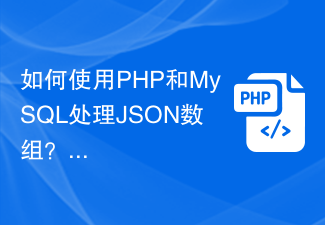 如何使用PHP和MySQL处理JSON数组?Jul 14, 2023 pm 07:13 PM
如何使用PHP和MySQL处理JSON数组?Jul 14, 2023 pm 07:13 PM如何使用PHP和MySQL处理JSON数组?简介:在现代的Web应用程序开发中,处理JSON数据已经成为常见的需求。PHP和MySQL是广泛使用的技术,了解如何使用它们来处理JSON数组将会大大提升开发效率和灵活性。本文将介绍如何使用PHP和MySQL处理JSON数组,并提供相应的代码示例。一、创建数据库表格在使用PHP和MySQL处理JSON数组之前,我们
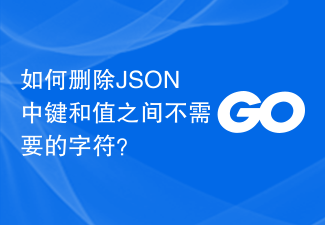 如何删除JSON中键和值之间不需要的字符?Feb 09, 2024 pm 05:15 PM
如何删除JSON中键和值之间不需要的字符?Feb 09, 2024 pm 05:15 PM我有这样的JSON:{"key1":"value1",\n\n"key2":"value2\nwithnewline"}我想要:删除\n\n保留value2\n和换行符。所以我将拥有一个有效的JSON。我尝试过:regex,但未能弄清楚如何在键和值之外指定。还有这个:packagemainimport("bytes""fmt")funcmain(){jsonStr:=`{"key1":"value1",\n\n
 征服 Java JSON 处理的巅峰:解析和创建复杂数据Mar 09, 2024 am 09:13 AM
征服 Java JSON 处理的巅峰:解析和创建复杂数据Mar 09, 2024 am 09:13 AM解析JSON数据解析JSON数据是处理复杂数据的关键一步。在Java中,我们可以使用以下方法:使用Gson库:Gson是一个广泛使用的jsON解析库,提供了一个简洁且高效的api,如下所示:Gsongson=newGson();JsonObjectjsonObject=gson.fromJson(jsonString,JsonObject.class);使用Jackson库:Jackson是另一个流行的JSON处理库,支持丰富的功能和对其他格式(如XML)的转换,如下所示:ObjectMappe
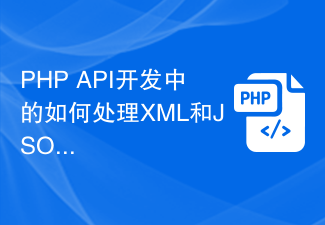 PHP API开发中的如何处理XML和JSON格式数据Jun 17, 2023 pm 06:29 PM
PHP API开发中的如何处理XML和JSON格式数据Jun 17, 2023 pm 06:29 PM在现代软件开发中,许多应用程序都需要通过API(应用程序接口)进行交互,允许不同的应用程序之间进行数据共享和通信。在PHP开发中,API是一种常见的技术,让PHP开发人员能够与其他系统集成,并使用不同的数据格式。在本文中,我们将探讨如何在PHPAPI开发中处理XML和JSON格式数据。XML格式数据处理XML(可扩展标记语言)是一种常用的数据格式,用于在不
 如何使用Python正则表达式进行JSON处理Jun 23, 2023 am 10:06 AM
如何使用Python正则表达式进行JSON处理Jun 23, 2023 am 10:06 AM在日常的编程工作中,有时候需要对JSON数据进行处理和提取信息,而正则表达式的强大功能可以帮助我们快速高效地完成这项工作。在这篇文章中,我们将会介绍如何使用Python正则表达式进行JSON处理。JSON是一种轻量级数据交换格式,常用于网络传输和数据存储。在Python中,我们可以使用json库解析JSON数据,但是有些情况下,我们需要对JSON数据进行一定
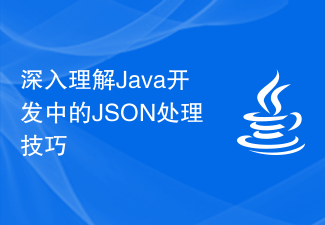 深入理解Java开发中的JSON处理技巧Nov 20, 2023 pm 01:17 PM
深入理解Java开发中的JSON处理技巧Nov 20, 2023 pm 01:17 PM深入理解Java开发中的JSON处理技巧摘要:随着互联网的发展和数据交互的广泛应用,处理JSON数据已成为现代软件开发中不可或缺的一部分。本文将深入探讨Java开发中的JSON处理技巧,包括JSON的基本概念、使用JSON的好处以及在Java开发中常用的JSON处理工具。一、JSON的基本概念JSON(JavaScriptObjectNotation)是
 如何使用PHP和MySQL处理JSON中的数字和浮点数?Jul 13, 2023 pm 01:06 PM
如何使用PHP和MySQL处理JSON中的数字和浮点数?Jul 13, 2023 pm 01:06 PM如何使用PHP和MySQL处理JSON中的数字和浮点数?在现代的Web开发中,数据的传输和存储通常使用JSON格式。JSON是一种轻量级的数据交换格式,广泛应用于前后端数据传递和API接口中。在处理JSON数据时,经常会遇到对数字和浮点数的处理需求。本文将讲解如何使用PHP和MySQL来处理JSON中的数字和浮点数。从JSON解析出数字或浮点数在PHP中,可


Hot AI Tools

Undresser.AI Undress
AI-powered app for creating realistic nude photos

AI Clothes Remover
Online AI tool for removing clothes from photos.

Undress AI Tool
Undress images for free

Clothoff.io
AI clothes remover

AI Hentai Generator
Generate AI Hentai for free.

Hot Article

Hot Tools

Safe Exam Browser
Safe Exam Browser is a secure browser environment for taking online exams securely. This software turns any computer into a secure workstation. It controls access to any utility and prevents students from using unauthorized resources.

ZendStudio 13.5.1 Mac
Powerful PHP integrated development environment

SublimeText3 English version
Recommended: Win version, supports code prompts!

Zend Studio 13.0.1
Powerful PHP integrated development environment

Dreamweaver CS6
Visual web development tools






